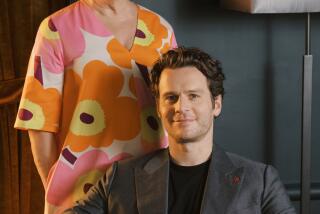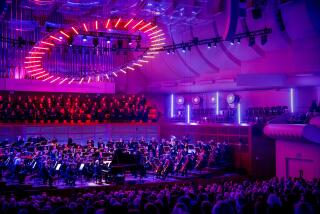Sound Tracker
- Share via
Mark Isham is a prolific film composer--this year alone movies with his name on them include “The Majestic,” “Impostor,” “Life as a House,” “Don’t Say a Word,” “Hardball” and “Save the Last Dance.” His music also is heard on the TV series “Family Law.”
Before Isham took on his first film project in 1983, “Never Cry Wolf,” he worked mostly as a jazz trumpeter and was known for his explorations into computer-driven music. Since then, he has occasionally played club dates and made recordings, but his main work has been composing for films and TV.
Other credits include “A River Runs Through It,” “Short Cuts,” “Quiz Show,” “The Net” and “Breakfast of Champions.”
Isham works in his home studio, where he is currently writing the score for a Dustin Hoffman-Susan Sarandon film, “Goodbye Hello.”
DESKTOP: In the studio we have three composing work stations, all using Mac computers. I have the dual processor G4 and the big, flat LCD screen.
I’ve been working on Macintoshes since the little Mac Plus. Back then, if you had 1 gigabyte of memory you were the richest man in the world. Now it’s to the point where they are so advanced, it’s actually fun to work on a computer.
Question: Why three of them?
Answer: I have three people who work under me, from those who help with the composing and arranging to the tech guy who keeps everything running. Everything in the studio is networked together, including the administration computer, which is an iMac.
Q: What kind of composing software do you use?
A: Right now we are using Logic and I am still getting used to it--there are some frustrating days. But it’s a pretty good all-around program that will do recording and mixing, and it will handle Midi.
We also have two PCs that are used for nothing but running sampling software.
Q: What kind of PCs?
A: I have no idea--I am such a Mac person. But we got them because the best sampling software is only for PCs.
Q: Did you record some of the music for “The Majestic” directly onto the computer?
A: I really do that only for the smaller projects. I have done several films for Alan Rudolph, and usually he has no money. We do it all at home so it doesn’t break the bank. But even on “The Majestic” I had a couple of string players come here so we could do some ambient sessions. I built up layers of string sound right on the computer and then it was combined into the recorded analog tracks.
Q: It sounds like it would be hard for you to do work at the rate you do it without computers.
A: Yes. Let me give you an example of how it works. I will start by composing in Midi, so that when the director comes over it can be heard with different instruments.
We will make adjustments and when we are both happy, I will e-mail it to the orchestrator. The orchestrator will work on software he has and then e-mail a copy back to me and one to the copyist, who will use software to write out all the parts for the orchestra. In the end, we have a score that could be ready for publishing, and nothing was actually written by hand on paper by any of us.
LAPTOP: I have a G3 PowerBook in my office that I use for my e-mail.
Q: After working on the big screen in the studio, is it hard to switch over to the small screen?
A: Yep. That big screen spoils everyone. Everyone here wants to work on it.
HAND-HELD: I have a Palm, but I just use it for phone numbers when I travel. Otherwise, I have a Filofax that sits on my desk.
It’s not something I am wildly efficient or smart about.
BOOKMARKS: I’m not much of a surfer guy. We wind up mostly going to tech sites for the different music software we use. Then there are sites for the kids: “Ask Jeeves” and encyclopedias.
I must admit that I do buy most of my CDs online.
Q: What did you buy recently?
A: The new Garbage CD and a recording of Ralph Vaughan Williams’ “Fantasia on a Theme by Thomas Tallis” conducted by Neville Marriner.
CELL PHONE: Unfortunately, yes. It’s attached to my hip. I have a Nokia, the little silver bullet. It would be nice to get away from it at times, but it’s also a fabulous tool, even just for finding other family members in Disneyland.
GADGETS: I have a couple of electronic metronomes; one is purely digital. One of the first things I do when I look at a scene is get a feeling for what tempo I’ll be using. I tap my foot and then I can take the metronome and get an exact reading for what tempo that is.
HOME STEREO SYSTEM: Nothing all that great, maybe because I spend so much time in the studio. In some ways it’s more interesting to have a common-man system in the house because it’s a great way to judge a piece of music. If it sounds good in that environment, I know I have it right.
*
As told to David Colker
More to Read
The biggest entertainment stories
Get our big stories about Hollywood, film, television, music, arts, culture and more right in your inbox as soon as they publish.
You may occasionally receive promotional content from the Los Angeles Times.










